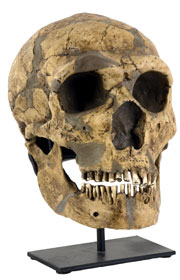Suggested Preparation for Anthropology Emphasis
 To be successful in anthropology courses you must have, or quickly develop, college level reading and writing skills and effective strategies for studying. At a minimum, you need to have completed college level writing, English 101, prior to registering for all 200-level anthropology courses (exception: Anthropology 201 requires placement into English 101 and eligibility for Math 92 or higher). It is highly recommended that you already have college level reading skills in place. Please realize these are minimum prerequisites and any additional course work that expands your reading, writing, and computational skills are going to be useful.
To be successful in anthropology courses you must have, or quickly develop, college level reading and writing skills and effective strategies for studying. At a minimum, you need to have completed college level writing, English 101, prior to registering for all 200-level anthropology courses (exception: Anthropology 201 requires placement into English 101 and eligibility for Math 92 or higher). It is highly recommended that you already have college level reading skills in place. Please realize these are minimum prerequisites and any additional course work that expands your reading, writing, and computational skills are going to be useful.
Because a student planning a degree track in anthropology could be choosing from an emphasis in archaeology, biological anthropology, cultural anthropology or anthropological linguistics it is crucial that you meet with an advisor prior to making your academic plans. That said, there are some common courses that are of use to all anthropology majors.
- As an anthropology student, a solid foundation in world languages is of great use. Either begin your study of a world language or expand on your previous language skills while at EvCC. World language skills are always useful, or in some case required, depending on your final university destination or academic plan.
- Do not delay taking your math courses. The more mathematical abilities you acquire, the broader the options later.
- Take a statistics class.
- Consider taking a course in social research.
- While at EvCC, avoid taking 100-level courses in anthropology (given that no more than one of these courses will transfer into your anthropology program at the university).
- In addition to the 200-level anthropology courses denoted in the curriculum guide, you are urged to look for courses marked as diversity courses. When feasible, choose a diversity (D-designated) course over one not a diversity course.
-
Volunteering is strongly suggested as a way to experience the community around you.
-
If you are thinking of a degree in archaeology, volunteer at a museum or look at Passport in Time

- Cultural anthropology and linguistics majors can look up field site volunteer opportunities by contacting your advisor. You might work with English as Second Language educators, become a literacy tutor, spend time at the Diversity Equity Center or the Refugee Forum, to suggest a few options.
- Biological anthropology majors might want to volunteer at the local zoo or primate center, a high school biology or chemistry laboratory, or a museum.
-
If you are thinking of a degree in archaeology, volunteer at a museum or look at Passport in Time
Please make sure to consult an academic advisor.

